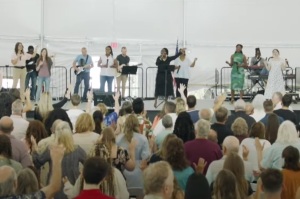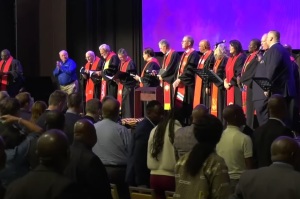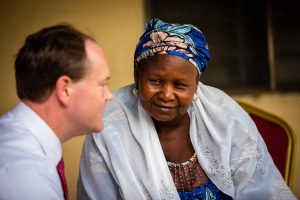Prof from former Soviet bloc: 'no gray area' in serving Christ
FORT WORTH, Texas -- A new faculty member at Southwestern Baptist Theological Seminary will be teaching students about sharing the Gospel in the midst of persecution. Suffering for the name of Christ is a subject he knows all too well.
John Moldovan -- Southwestern's first faculty member from the former Soviet bloc -- once languished in a Romanian prison cell fearful of what might happen to him and his family. Communist police officers, he said, tortured his body, mind and soul, and he eventually collapsed from the pressure.
Only his faith in Christ sustained him and absolved his fears.
"As I came back to my senses, I realized that fear -- that paralyzing, crushing fear -- was gone," Moldovan, recently elected as associate professor of evangelism and intercultural studies by the Fort Worth, Texas, seminary's trustees, said during an April 15 chapel service.
Moldovan told of growing up in communist Romania where he struggled to follow in the Christian heritage of his grandfather and father. His grandfather had converted from Russian Orthodoxy to the Baptist faith while imprisoned in a Russian camp during World War I. He later was sentenced to death by drowning because of his zeal to spread the gospel, but was able to escape.
His father also was an "effective and uncompromising Baptist minister" who was regularly persecuted for his faith, Moldovan said. In fact, his faith in Christ led to his assassination.
"My father was killed in what we have seen as a 'staged accident' just as he left the church," Moldovan said.
Exposed daily to the "gospel of Marxist Leninism," Moldovan's teachers also pressured him to abandon his faith. His file at school was labeled "SON OF A BAPTIST PASTOR."
"I was mocked by teachers and students alike," he said. "At one point, I came to resent the fact that God allowed me to be born in a Christian family, even worse the son of a Baptist minister."
But at the age of 17, Moldovan accepted Christ as his personal Savior. He was then forced to attend school Monday through Saturday and even on Sundays for "additional indoctrination." He managed to go to church, but tried at the same time to please the communist authorities.
"I was still somehow paralyzed by fear," Moldovan said. "I believed in Jesus Christ. I accepted Him as my Lord and Savior, and yet picking up that cross and following Him on that narrow road of suffering was probably too much. I lacked courage when He called me to be a witness."
Moldovan said the Christians in Romania during that time did not have Sunday Schools, theological books, tracts or discipleship materials, but several Christians began meeting in private homes for times of prayer and Bible study. It was during those meetings that Moldovan became convicted of his sin of fear.
"I was set free not only to believe in Him, but to take that narrow road, the road of the cross," Moldovan said. "I was truly liberated, not only in sharing my testimony, not only in preparing messages -- preaching, teaching, engaging in evangelistic work -- but free, free to enjoy life."
Moldovan's ministry and that of his fellow believers exploded as they all sought to take the Gospel to young and old alike, he said. In fact, his refusal to stop his ministry and cooperate with the secret police during a revival in 1973 and 1974 resulted in several arrests, threats, interrogations and even torture.
In 1980, he was imprisoned for the last time. He and another believer were tried and forced to serve as their own legal counsel. Authorities pressed them to give up their Romanian citizenship and, when they refused to do so, the authorities revoked it and gave them a deadline to leave the country.
"We parted ways, arrived in Rome, and in 10 days we were accepted as refugees in the United States," Moldovan said.
He and his family arrived in New York City and wondered what was next, but he soon was asking friends for recommendations of seminaries where he could build upon his theological education. A 1965-model car was donated to the family, and they made the trip to Fort Worth, Texas, "at the high speed of 40 miles per hour." Moldovan earned a master of divinity degree and Ph.D. from Southwestern in 1987 and 1994, respectively.
During his days of study, numerous atrocities occurred in his homeland. He said he left 20 of his disciples in Romania and they worked to spread the gospel of Jesus Christ. Some were arrested and some were killed, but the work continued.
"So powerful was the gospel, it penetrated all the circles," Moldovan said. In the fall of 1989, he recounted, the secret police went to arrest a Reformed Hungarian pastor in Romania, but the pastor's congregation took a stand and said they would have to be arrested with him. The crowd continued to grow and the stand went into the night. The police called for reinforcements and later opened fire on the crowd.
"It was a massacre that night," Moldovan said, but in the days to come the incident sparked the dictator's apprehension and execution for numerous crimes. The people were set free and, on Christmas Day 1989, celebrated in the streets.
"I want you to understand that the Gospel is such a powerful action," Moldovan said. "I do not stand for a political party. I do not stand for a club. I do not stand for an association, but I stand as a representative of our Lord and Savior Jesus Christ. That's the highest honor someone can have."
Fearless leaders are needed for the 21st century, Moldovan said, noting, "There is no gray area. Pick up the cross. Identify with Him, with His Gospel, with His Kingdom."
Moldovan has served as an adjunct professor at Southwestern since 2001 and as chair of the department of missions and evangelism at Criswell College in Dallas since 1992.
By Albert H. Lee
chtoday_editor@chtoday.com





























